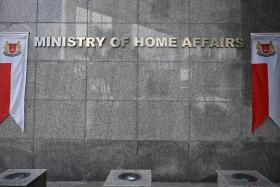Repealing 377A is the right thing to do, MPs’ duty to act on the law and not the courts’: Shanmugam
Consensual sex between adult men does not raise concerns about law and order and hence should not be looked at as a criminal issue, Home Affairs and Law Minister K. Shanmugam said in Parliament on Monday.
Furthermore, Section 377A of the Penal Code, which criminalises such acts, harms gay people in Singapore, he said during the debate on repealing the law.
He added that there has been a clear risk of the law being struck down in the courts and if Parliament allowed this to happen, MPs would be avoiding their duty and the outcome would be worse for Singaporeans.
He said: “So I say, the time has come for us to remove Section 377A, because it humiliates and hurts gay people.
“Most gay people do not cause harm to others, they just want to live peacefully and quietly and be accepted as part of society the same as any other Singaporean.”
Mr Shanmugam said gay Singaporeans do not deserve to be stigmatised for their sexual orientation.
He added: “To a gay person, even if Section 377A is not enforced, it is there: memorialised in law, a sword hanging over his head, a daily reminder that every time he engages in private sexual activity behind closed doors in the sanctity of their bedrooms, he is nevertheless a criminal.
“We have to ask: is it fair that gays have to live in this way?”
He said this is not a situation that Singaporeans should accept, even if they personally disagree with homosexuality. He added that even many of those who do not want the law to be repealed do not want it enforced.
Mr Shanmugam said for this reason, the law should no longer be on the books and repealing it makes it clear that gay people are not criminals.
He was speaking in a wide-ranging debate on repealing the law that over 30 MPs are expected to speak in, following an announcement by Prime Minister Lee Hsien Loong at the National Day Rally in 2022 that the Government would remove the law which has stood since colonial times.
At the time, PM Lee added that the Government would also amend the Constitution to ensure that the legal definition of marriage defined as between a man and a woman would be left to Parliament and not the courts.
377A is an issue for Parliament, not the courts
Mr Shanmugam also spoke on a second reason for repealing the law: a significant risk that the courts may strike it down in the future if Parliament were to leave it alone.
The law sustained two challenges in the courts in the last 10 years on the claim that it violates Singapore’s Constitution, the Court of Appeal on Feb 28 ruled that the law was “unenforceable in its entirety”.
Mr Shanmugam went through the legal arguments surrounding the decisions the courts made before making the point that allowing the courts to decide such a difficult societal issue would be an abdication of responsibility on the part of Parliament and could lead to a cascade effect of challenges to various policies.
He said in Singapore’s system, it is not the role of the courts to deal with such issues which need Parliament’s ability to build consensus and consider various points of view.
He said: “Court processes are adversarial by nature. Their decisions are binary - it is a zero-sum game; you either win or you lose. There is no middle ground, no balancing of competing interests.
“The courts cannot consider competing social norms and social consequences of their decisions.”
Allowing Section 377A and the even the definition of marriage to be changed through a court challenge could create a cascading effect impacting questions relating to media content, housing and other policies, he said.
Such changes through the court are not in Singapore’s interests, Mr Shanmugam said.
He said that to act in the best interests of society, the Government must move on this issue given the legal analysis.
He said: “We can look at the US to see how court decisions on such issues can seriously affect the fabric of society, divide the society and unleash partisan views on both sides of the divide.
“If we have that in Singapore, our social fabric will fray.”
He then implored MPs to do what is expected of them and chart a path forward on the difficult issue.
377A’s roots reach back to medieval England
Mr Shanmugam also sketched the historical context behind the adoption of the law in Singapore, going back to its roots in medieval England.
The law - which outlaws “any act of gross indecency with another male person” - was introduced in 1938 when Singapore was a British colony.
Its roots however, lie deeper and is almost word-for-word a copy of a law from the United Kingdom, said Mr Shanmugam.
This law was passed in 1885 and its own origins are obscure, he added.
He said the Government has not been able to find any background on why the law was introduced, but it did find that the law was introduced at 2.30am with few MPs present in the British Parliament as a last-minute amendment to an entirely unrelated Bill meant to protect women and girls and suppress brothels.
It was introduced by an MP called Henry Labouchere whose motives for doing are unclear, he said.
There are two schools of thought on the issue in Britain, he said - Mr Labouchere had either intended to use the amendment to derail the main Bill or he was personally fiercely homophobic.
Mr Shanmugam also spoke on the legal situation surrounding homosexuality in England at the time, adding that it entered secular law from Church law through the Buggery Act as the result of a political struggle at the time.
When a 15th-century English King Henry VII wanted to divorce his wife, he broke with the Catholic Church in Rome and started the Church of England as the Roman Church would not grant him the divorce.
He wanted to reduce the power of the church and one way he did this was by converting many of the Church’s laws into secular laws, said Mr Shanmugam.
This and other laws outlawing consensual homosexual acts were reviewed in the United Kingdom by a committee appointed in August 1954.
Known as the Wolfenden Committee, it published a report in 1957 which said it was not a function of criminal law to intervene in the private lives of citizens or to seek to enforce any particular pattern of behaviour, he said.
The committee said the law must continue to criminalise homosexual behaviour in public and to protect the young and intellectually disabled.
It eventually recommended that private and consensual homosexual acts should not be criminal offences, a position which was debated throughout the 1950s and 1960s as societal attitudes in the UK began to change.
Homosexuality was eventually decriminalised in 1967, he said.
Diversity of views on homosexuality around the world
Mr Shanmugam also spoke on the various views on homosexuality held around the world, saying that it remains a deeply divisive issue.
He said that divisions can be seen even in religiously homogenous communities like the global Anglican church, adding that some churches in the United States and Canada are supportive of homosexuality while other churches are not.
Mr Shanmugam also said that the US is considered more accepting of lesbian, gay, bisexual and transgender (LGBT) people than many other countries, but remains internally split.
Some Republican states like Florida and Texas still have strong objections to LGBT rights, he said, and many believe that homosexuality is an abnormal lifestyle choice - a view which is espoused by the Republican Party of Texas. But other Republicans disagree.
Mr Shanmugam added: “The challenge is much greater for us in Singapore: we don’t have a single ethnic society, or a single religious denomination.
“It is not a matter that has a straightforward answer but we will still have to try and find the right way forward for us as a society without tearing up our social fabric.”
He added that globally, there is a general movement even in Asian countries towards the decriminalisation of homosexual sex.
Mr Shanmugam said: “In Singapore, we chart our own path based on what we believe is in our best interests.”
Touching on the debate about the law in 2007 in a review of the Penal Code, Mr Shanmugam said that Singapore society is now at a stage where it can accept a repeal of the law.
He said: “From our engagements we see that most Singaporeans accept that sex between men should not be a crime.”
He added that the Government has made it clear to foreign governments and companies that these are political, social and moral choices for Singaporeans to decide and they should not interfere.
In August, US politician Nancy Pelosi issued a statement when she was in Singapore asking business groups to support its LGBT, in response to which the Ministry of Home Affairs asked foreign businesses to be careful about advocating socially divisive issues in Singapore.
He said: “To US politicians who feel strongly on such issues, they should first try to convince people in Texas and other such places before they issue statements about Singapore.”
Get The New Paper on your phone with the free TNP app. Download from the Apple App Store or Google Play Store now


